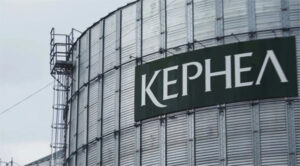
Chernivtsi Solar LLC, part of the Kernel group of companies, plans to build the largest solar power plant in western Ukraine with a declared capacity of 250 MW in the Kitsman territorial community in Chernivtsi region, according to a report by Molodyi Bukovynets on Monday, citing acting mayor of Kitsman Ivan Semenyuk.
“This is one of the largest strategic initiatives and projects in the community in its entire history (…) All stages of preparation have now been completed, from land issues to agreements with investors,” Semenyuk said.
The SES will be located on an area of 212 hectares, with the first works starting in the spring of 2026.
“At the first stage of the SES construction, the community budget will receive UAH 8.6 million per year. Then the amount will increase to UAH 12 million per year. The lease agreement is concluded for 25 years. In total, the volume of investments will amount to UAH 5 billion,” said the acting head.
According to him, the investor company is currently completing the design stage of the SES and will carry out installation work for the implementation of the first phase in the spring of 2026.
Before the war, the Kernel agricultural holding company ranked first in the world in the production of sunflower oil (about 7% of global production) and its export (about 12%). It is one of the largest producers and sellers of bottled oil in Ukraine. In addition, it is engaged in the cultivation and sale of agricultural products.
In the first nine months of 2025, Kernel increased its net profit by 7% to $218 million, its revenue for the period grew by 19% to $3 billion 92 million, and EBITDA increased by 4% to $398 million.
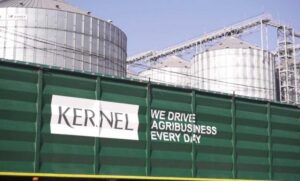
According to the annual report published on the WSE, the Kernel agricultural holding reduced its capital investments in the 2025 financial year by almost half — to $73 million compared to $143 million a year earlier.
According to Andriy Verevsky, 2025F was one of the most difficult periods: due to poor harvests and reduced stocks, farmers held back their products in anticipation of price increases.
“The EBITDA margin fell from $121 to $66 per tonne as a result of aggressive behaviour by producers who speculated on future prices,” he said.
Kernel is Ukraine’s largest exporter of agricultural products, controlling about 10% of the global sunflower oil market and 27% of Ukrainian exports. Its main assets are terminals in the Black Sea basin, oilseed processing plants, and a logistics network across the country.
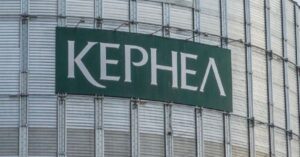
“Kernel, one of Ukraine’s largest agricultural holdings, posted $682 million in gross profit in fiscal year (FY) 2024, up 7% from FY 2023.
According to the annual report published on the company’s website, Kernel earned $3.581 billion in revenue last fiscal year, up 4% year-on-year.
“This growth was driven by increased sales volumes across all key products – grain, sunflower oil and sunflower meal – due to the reopening of exports to Ukrainian Black Sea ports in mid-October 2023. This growth was partially offset by lower realized prices. Cargo transportation and other services reached a record high of $405 million, accounting for 11% of total revenue. Export sales accounted for 94% of total revenue,” the report says.
At the same time, Kernel recognized a loss of $10 million from changes in the fair value of biological assets and agricultural products in FY2024, compared to a loss of $115 million in FY2023.
The cost of sales in FY2024 increased by 7% year-on-year to $2.889 billion, driven by a 7% year-on-year increase in the cost of goods for resale and raw materials used, as well as a 7% increase in shipping and handling costs, the company explained.
At the same time, Kernel estimated losses from property damage and business interruption due to Russia’s war against Ukraine at $71 million, up 33% year-on-year, and reported that it received a one-time insurance payment of $34 million.
In FY2024, the agricultural holding received $9 million in profit from securities transactions (including Avere trading), inventory income, foreign currency gains, and income from contract termination.
In FY2024, Kernel’s other operating expenses amounted to $23 million, down 34% year-on-year. This included $17 million of shipping and other penalties (due to long waiting times for loading and unloading vessels in ports) and a $5 million loss from the Group’s securities and derivatives operations.
The agroholding increased salaries and related expenses by 24%, or $81 million. As a result, general and administrative expenses in FY2024 increased by 4% year-on-year to $213 million, mainly due to higher salaries and related expenses.
In addition, Kernel recognized net impairment losses on financial assets of $11 million, which reflects the provisions made for receivables and loans to third parties.
The agroholding also recorded a loss of $229 million in FY2024 due to impairment of property, plant and equipment ($117 million), impairment of goodwill related to two oilseed processing plants previously acquired by Kernel ($58 million), and impairment of intangible assets related to the port transshipment business ($24 million).
In addition, the agricultural holding mentioned the impairment of prepayments to suppliers and other current assets ($6 million), the write-off of assets destroyed by Russian shelling ($14 million), etc.
As a result, Kernel’s operating profit in FY2024 decreased by 37% compared to the same period in FY2023 to $276 million.
Financial expenses in FY2024 decreased by 22% year-on-year to $119 million, driven by a significant repayment of the group’s bank loans in December 2023 and a decrease in lease payments following the sale of a part of the agricultural business in March 2023.
Financial income in FY2024 increased by 62% year-on-year to $50 million, mainly due to interest accrued on financial assets held for cash management as additional liquidity balances were allocated to interest-bearing instruments. This also included a non-cash gain of $6 million on the repayment of certain credit facilities at a discount.
As a result, net financial expenses decreased by 43% year-on-year to $69 million.
Net foreign exchange gain amounted to $33 million, mainly due to the devaluation of the Ukrainian hryvnia against the US dollar during the reporting period and the corresponding revaluation of intra-group balances.
Other expenses, net, increased 2.5 times year-on-year to $29 million. Among them, the agricultural holding mentioned expenses for charitable and social projects of $25 million, fines and penalties of $6 million, as well as $2 million of profit from the sale of subsidiaries, as the Group completed the sale of three floor-type granaries in FY2024.
The Group reported operating profit of $604 million before working capital changes, down 20% year-on-year. This was 59% higher than EBITDA for the period, reflecting the impact of significant non-cash items recognized during the year.
After accounting for foreign currency translation differences, total comprehensive income attributable to shareholders in FY2024 amounted to $63 million, up 7% year-on-year.
The Board of Directors has recommended to the General Meeting of Shareholders to declare dividends of zero for the year ended June 30, 2024.
Before the war, Kernel Agro Holding was the world’s leading producer of sunflower oil (about 7% of global production) and its exports (about 12%). It is one of the largest producers and sellers of bottled oil in Ukraine. In addition, it is engaged in the cultivation and sale of agricultural products.

The Poltava Oil Extraction Plant (POEZ) of the Kernel agricultural holding has officially switched to renewable energy sources certified by the international organization Bureau Veritas Group, the company’s press service reported on Facebook.
According to the report, the agricultural holding will fully supply POEZ with renewable energy from sunflower husks, thereby reducing its dependence on fossil fuels and cutting greenhouse gas emissions by more than 11,000 tons per year. In addition, autonomous power generation will ensure continuity of production and reduce risks to food security.
“This is another step towards transforming Ukraine into a sustainable, energy-independent, and innovative country that knows how to turn agricultural resources into strategic advantages. Now our consumers can make an informed choice and contribute to the green recovery of the country’s economy by supporting a producer of certified sustainable oil,” Kernel emphasized.
It is specified that POEZ became the first company in Ukraine’s food sector to join the Science Based Targets Initiative (SBTi). In addition, it intends to support communities and supply surplus “green” energy to Ukraine’s power grid.
“This step is part of Kernel’s efforts to decarbonize and ensure climate resilience at every stage of our work: from the field to logistics,” the agricultural holding summarized.
The Poltava OEZ of the Kernel agricultural holding specializes in the production of sunflower oil under the Stozhar trademark. Previously, oil under this brand was produced in Vovchansk (Kharkiv region). With the start of the full-scale invasion of Ukraine by the Russian Federation, the work of the SEZ in Vovchansk was suspended and its capacities were transferred to the Poltava region. Before the war, the processing capacity of the Vovchansk SEZ was 330,000 tons of sunflower seeds per year. In turn, the Poltava SEZ is designed to process up to 430,000 tons of sunflower seeds per year and produces unrefined, refined, and hydrated vegetable oil, as well as meal.
Before the war, the Kernel agricultural holding company ranked first in the world in the production of sunflower oil (about 7% of world production) and its export (about 12%). It is one of the largest producers and sellers of bottled oil in Ukraine. In addition, it is engaged in the cultivation and sale of agricultural products.
In the first nine months of 2025, Kernel increased its net profit by 7% to $218 million, with revenue growing by 19% to $3.092 billion and EBITDA increasing by 4% to $398 million.
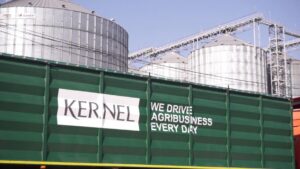
Kernel, one of Ukraine’s largest agricultural holdings, exported 1.6 million tons of grain in the third quarter of fiscal year 2025 (FY, third quarter – January-March 2025), down 15% from a year earlier.
According to the quarterly report on the company’s website, the decline in exports was due to limited domestic supply caused by a poor harvest in 2024 and lower stocks.
“Nevertheless, Kernel maintained its strong market position, accounting for 12% of Ukraine’s total grain and oilseed exports in the first nine months, with total volumes reaching 4.4 million tons,” the report said.
According to the agricultural holding, the export terminal’s throughput capacity in the third quarter of fiscal year 2025 was 2.5 million tons, up 2% from the previous year, including 1.8 million tons of grain, 0.3 million tons of edible oil, and 0.4 million tons of vegetable meal.
Total throughput for the nine months of fiscal year 2025 increased by 65% compared to the previous year to 7.3 million tons, thanks to smooth export operations and a low base of comparison with fiscal year 2024, when exports were interrupted at the beginning of the season.
Grain receipts at elevators in the third quarter of fiscal year 2025 amounted to 91 thousand tons, reflecting typical seasonal dynamics. This brought the total receipts for the nine months of fiscal year 2025 to 2.7 million tons, down 2% from the previous year.
Of this volume, the agricultural holding’s own segment provided 1.5 million tons, with the remainder purchased from third parties.
The infrastructure and trade segment recorded EBITDA of $62 million for January-March 2025, representing a decrease of 46% year-on-year and 21% quarter-on-quarter. Of this total, the trading business provided $26 million, unchanged from the previous year, while Kernel’s grain and edible oil export value chain in Ukraine generated $36 million, down 59% year-on-year.
Before the war, Kernel was the world’s leading producer of sunflower oil (about 7% of global production) and its exporter (about 12%). It is one of the largest producers and sellers of bottled oil in Ukraine. In addition, it is engaged in the cultivation and sale of agricultural products.
In the first nine months of 2025, Kernel increased its net profit by 7% to $218 million, with revenue growing by 19% to $3.092 billion, and its EBITDA increased by 4% to $398 million.
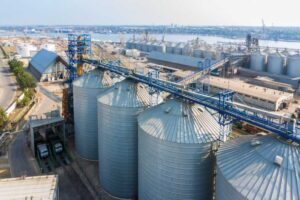
Kernel, one of Ukraine’s largest agricultural holdings, reported net income of $41 million in the third quarter of fiscal year 2025 (January-March 2025), compared with $101 million in the same period of fiscal year 2024.
According to the quarterly report published on the company’s website, Kernel’s consolidated revenue in the third quarter of FY 2025 reached $1.145 billion, up 14% compared to the same period last year, but remained at the previous quarter’s level.
“These results were achieved thanks to high sales prices, and the increase in grain exports offset the decline in revenues from the sale of bottled oil,” the company explained.
The group’s sales expenses increased by 27% compared to the same period last year, to $984 million, due to higher raw material costs and reflecting increased competition for raw materials and supply constraints.
Gross profit for the third quarter of fiscal year 2025 was $137 million, down 34% from the same period last year, reflecting lower margins in the oilseed processing and infrastructure and trading segments.
Kernel also notes that during the reporting period, the company’s EBITDA amounted to $110 million, which is 6% less than in the previous quarter and 31% less than in the previous year. At the same time, the oilseed processing segment generated EBITDA of $36 million, down 26% from the previous year, due to lower sales volumes and margin compression as a result of a relatively low sunflower seed harvest in Ukraine.
EBITDA for the Infrastructure and Trade segment fell by 46% compared to the same period last year, to $62 million, of which $26 million was generated by Avere’s trading activities, and the remaining $36 million was earned from the value chain of grain and edible oil exports in Ukraine, The main factors affecting the results were export terminals and grain trading operations.
It is noted that in the third quarter of fiscal year 2025, the Agriculture segment recorded EBITDA of $34 million, 2.1 times more than last year. This figure also includes non-cash losses of $24 million related to the revaluation of biological assets, compared to losses of $25 million last year.
According to the report, cash inflows from investing activities amounted to $25 million (in the third quarter of 2024, there was an outflow of $127 million), mainly reflecting $46 million in proceeds from the sale of financial assets previously used to manage excess liquidity, while $19 million was used to purchase fixed assets.
Kernel notes that during the reporting period, after the peak of working capital financing, it repaid a significant portion of its debt, including full repayment of its debt to the EBRD and pre-export financing for sunflower oil, as well as early repayment of part of its outstanding debt to the EIB.
As a result, during January-March 2025, the group’s debt obligations decreased by $190 million to $755 million. In addition, the company received an extended waiver from one of its long-term lenders, which is valid until June 30, 2026.
This allowed Kernel to reclassify them as non-current liabilities, which improved financial stability. As of March 31, 2025, the group’s cash balance was $549 million, down 11% from the previous quarter. This led to a 37% reduction in net debt on a quarterly basis to $206 million.
The company also notes that for the third quarter of 2025, commodity inventories decreased by 16% to $371 million as of March 31, 2025.
The report also indicates that for the first nine months of this fiscal year, Kernel increased its net profit by 7% to $218 million, with revenue growing by 19% to $3.092 billion, and EBITDA increasing by 4% to $398 million.
Before the war, Kernel was the world’s leading producer of sunflower oil (about 7% of global production) and its exporter (about 12%). It is one of the largest producers and sellers of bottled oil in Ukraine. In addition, it is engaged in the cultivation and sale of agricultural products.